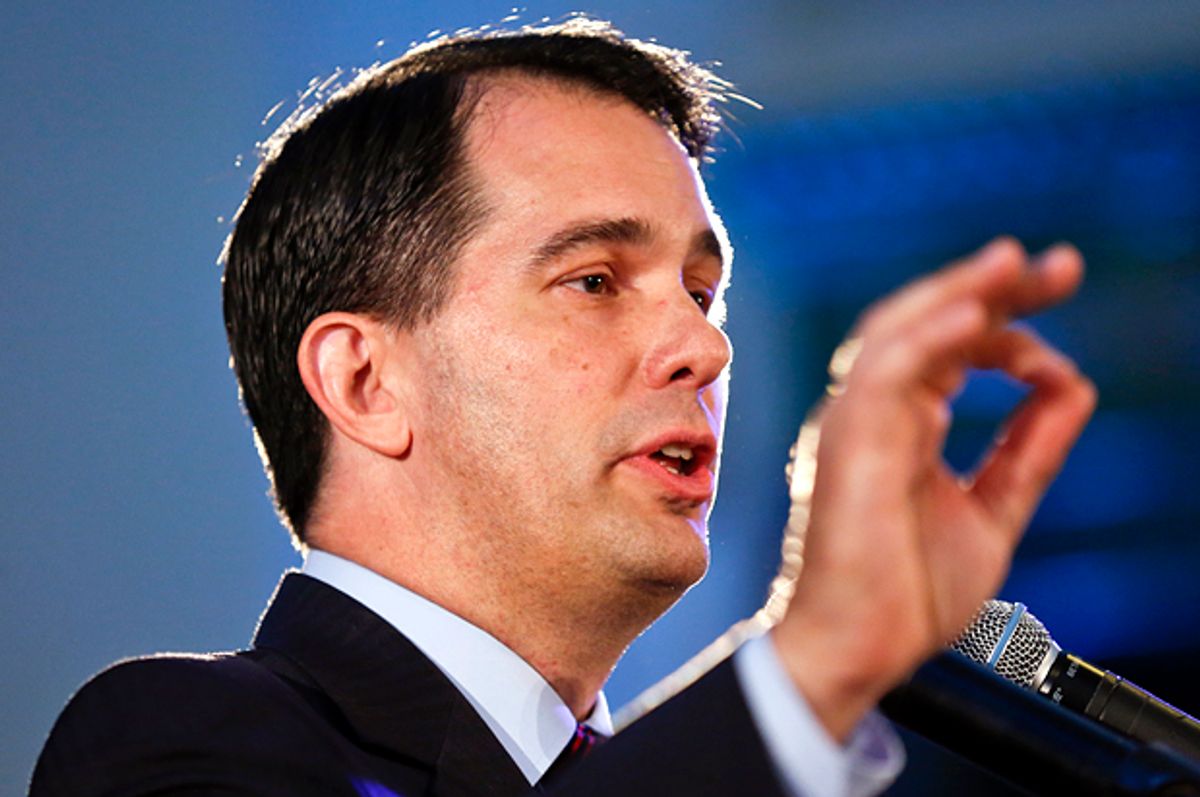Three months after winning a fiercely contested re-election battle by a wider-than-expected margin, Wisconsin Gov. Scott Walker increasingly looks as if he may be poised to claim another prize: the GOP's 2016 presidential nomination.
Walker has long had a conceivable path to the GOP nod. As Nate Cohn argued last month, the union-buster is an excellent position to emerge as the leading alternative to Jeb Bush, who currently holds a soft lead in national polls of the GOP field. Beloved by both the Tea Party and business-minded conservatives, Walker has the potential to unify the GOP's establishment and activist wings. As an evangelical Christian, he also appeals to religious conservatives, another key segment of the Republican base. And given that Walker has won three elections in a blue state in the past four years, he easily ranks among the GOP's most battle-tested contenders.
Until recently, Walker's road to the nomination made sense primarily in theory. But recent polling indicates that one year before the presidential primary season kicks off, Walker has claimed a place in the top tier of the GOP's potential candidates. Though he continues to poll near the middle of the field nationally, Walker is showing early strength in Iowa and New Hampshire, the first two states to have their say in the nominating process. A Des Moines Register/Bloomberg poll released over the weekend found Walker leading a crowded GOP contest with 16 percent support, followed by Rand Paul at 15 percent and Mike Huckabee, the winner of the 2008 Iowa caucuses, at 13 percent. Bush ranked fifth, taking nine percent of the vote, just behind retired neurosurgeon Ben Carson's 10 percent.
Meanwhile, a NH1 Pulse Poll released today found Walker surging in the Granite State, leading the pack with 21 percent support. Bush finished second in the poll, taking 14 percent, followed by Rand Paul at eight percent. Winning both Iowa and New Hampshire would mark an historic feat for Walker; not since 1976 has a Republican won both states in a seriously contested race for the nomination.
Prior to his withdrawal from contention last week, 2012 nominee Mitt Romney, who owns a home in the New Hampshire and was governor of neighboring Massachusetts, had led in New Hampshire. Today's poll suggests that Walker may be the prime beneficiary of Romney's decision to step aside. Indeed, as Politico reports, Walker has moved aggressively in recent days to woo Romney donors and other well-heeled contributors to his camp. Moreover, Walker's close ties to the Koch network may position him well to go toe-to-toe with Bush's formidable fundraising machine.
Of course, Walker comes with weaknesses. As his cringeworthy interview with ABC's Martha Raddatz on Sunday attests, the governor remains unschooled on foreign policy. Additionally, being governor carries the risk of time-consuming, divisive showdowns with state legislators, as Walker knows all too well from his successful 2011 fight to gut collective bargaining rights for public employees. Walker's latest budget has recently come under fire for targeting the state's prized university system, underscoring potential challenges ahead.
That said, Walker learned from his anti-union effort that while such battles may draw the ire of progressives, they can also boost his standing among fellow Republicans. Come next year, that approach may well reap dividends.



Shares